Kat Aristyl and Molette Smith, both U.S. Army veterans, were searching for new places to live in Georgia this summer. Both women found homes with help from Atlanta Neighborhood Development Partnership, Inc. (ANDP) a NeighborWorks organization that creates and preserves affordable housing.
"Since 2013, when it became clear that more of our nation's brave men and women were going to be returning from the theater of war, we decided to focus some of our single family housing and rental work on housing veterans," says George Burgan, ANDP's senior director for communications and technology. "There was a clarion call among organizations and corporations to find a way to reorient and welcome back those who served and help them achieve the dream of homeownership or at the minimum, affordable housing."
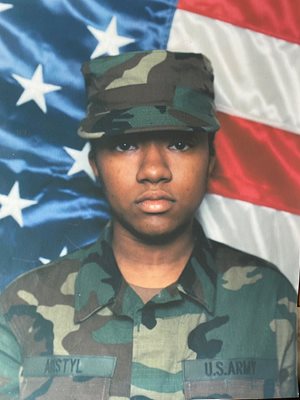 Aristyl served in the U.S. Army for three years. She was deployed to Iraq before leaving the service on a medical discharge after a fall from a five-ton truck left her with back injuries.
Aristyl served in the U.S. Army for three years. She was deployed to Iraq before leaving the service on a medical discharge after a fall from a five-ton truck left her with back injuries.
"I was always fascinated by the military," Aristyl says. "When I was graduating from high school, I was thinking about it." A cousin who had recently enlisted convinced her it was the way to go. She signed up.
Smith signed up for a different reason, after watching an Army commercial with her grandmother. "She said the military wasn't for women," Smith recalls. "I went to the recruiting station and they asked me if I liked to travel."
Smith became a supply specialist. She spent time in Germany, and like Aristyl, she served for three years. Out of the military, both women needed a little help when it came to finding a place to live. Now they are among the 160 homebuyers and renters ANDP has served since 2013. Of NeighborWorks' nearly 240 network organizations, 215 report working with veterans. From 2017 to present, those organizations have helped 2,476 veterans or active military personnel find homes. In 2019, they helped 2,983 veterans or active military find rentals.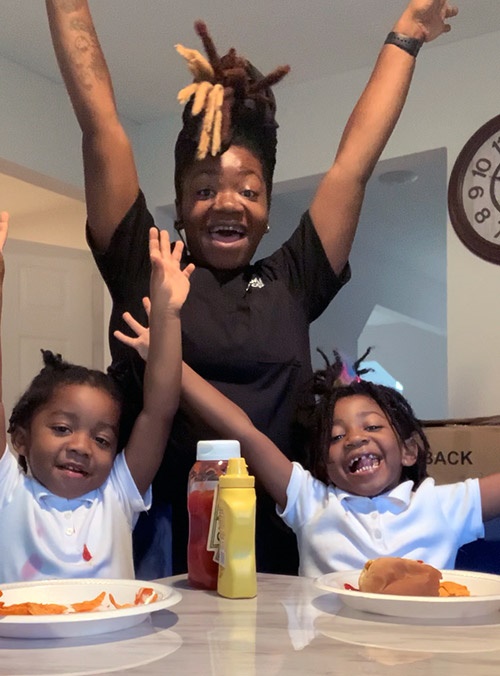
The network organizations provide different types of programs. ANDP offers up to $7,500 in closing cost assistance, additional down payment resources, homebuyer education, and access to newly renovated homes. They also offer a "first look" to veterans before opening some homes to the general public. For rentals, they waive security deposits and offer gift cards. Veterans Day is spent honoring those veterans. "It's been going well," Burgan says.
In Atlanta, post 9-11 veterans have had a harder time getting into home ownership, he says, quoting a report from Apartment List RENTONOMICS. "There's a need to close the wealth gap," he says. Homeownership is one way of closing it.
Burgan says it can be more difficult to reach today's veterans, who don't gather at VFWs the way older veterans have historically done. "It can be a challenge," he says. "You have to keep your antennae aligned with veterans' service organizations. It's about keeping your ear to the pavement." He speaks in front of groups of veterans whenever possible.
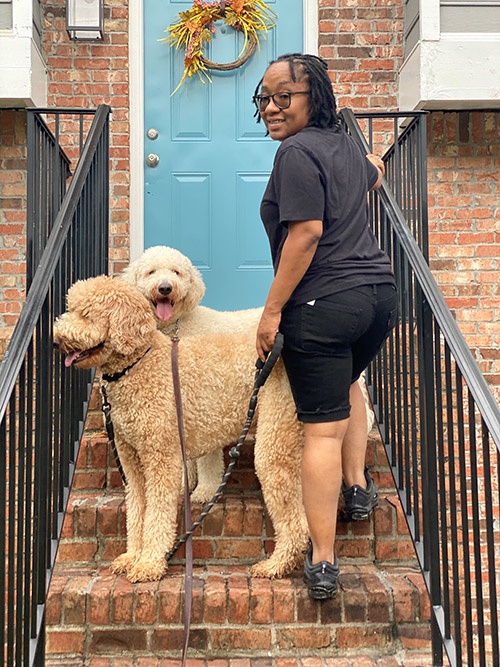 Aristyl had been living in Smyrna, Georgia, where housing was getting more expensive, she says. Through research, she learned about ANDP's program for veterans, which helped her with much-needed closing costs. It was hard to save that money, especially as her back pain has kept her from working. Now, she says, she has a four-bedroom house, with room for her dogs and for family members to visit. She also has a crafting room.
Aristyl had been living in Smyrna, Georgia, where housing was getting more expensive, she says. Through research, she learned about ANDP's program for veterans, which helped her with much-needed closing costs. It was hard to save that money, especially as her back pain has kept her from working. Now, she says, she has a four-bedroom house, with room for her dogs and for family members to visit. She also has a crafting room.
Smith was living in Ellenwood, Georgia, and says she needed to find a place to move with her two children, ages 3 and 4. She had told her real estate agent that she was both a single mother and a veteran, hoping there might be a program that could assist her. She found a home that ANDP had refurbished, with a preference for veterans. "I was on the brink of applying for an apartment," she says. But she found out she qualified for a home and for help with closing costs.
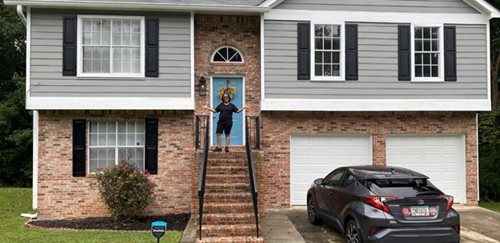 "Being able to be in a home-- it feels amazing," Smith says. "This is mine. No one can take credit or take it from me." She says she's glad to be in a safe, healthy environment with her children.
"Being able to be in a home-- it feels amazing," Smith says. "This is mine. No one can take credit or take it from me." She says she's glad to be in a safe, healthy environment with her children.
Aristyl says she loves spending time in her kitchen. "I love the space and I love having a gas stove. It's been two months since I've been in my new home and it feels great to have something to call my own."
Establishing housing for veterans in Massachusetts
In Haverhill, Massachusetts, Coalition for a Better Acre (CBA) had so much success with Welcome Home, a veterans housing development that they completed in 2015, that they're working on a developing a new property with preference for veterans.
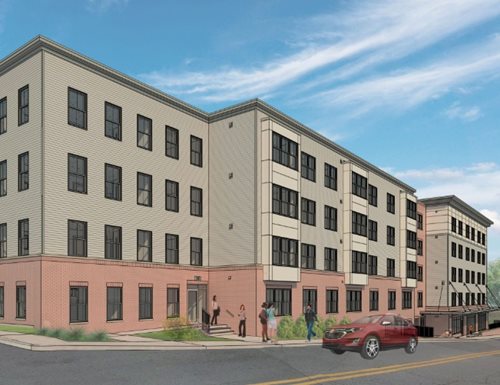 Claire Ricker, director of real estate for the organization, says communities that have been historically reluctant to embrace affordable housing have been supportive of projects that help veterans. "I think it helps stakeholders understand what goes into this and who is using and needing this type of housing," she says. And speaking of support – coalition's developments, in partnership with a veteran's nonprofit, provides support services for veterans, including counseling, workforce training and job placement.
Claire Ricker, director of real estate for the organization, says communities that have been historically reluctant to embrace affordable housing have been supportive of projects that help veterans. "I think it helps stakeholders understand what goes into this and who is using and needing this type of housing," she says. And speaking of support – coalition's developments, in partnership with a veteran's nonprofit, provides support services for veterans, including counseling, workforce training and job placement.
"We've had a ton of interest," Ricker says, adding that Veterans Northeast Outreach Center also helps them identify veterans who are good fits for the properties. "We're trying to put in housing for these populations, and also provide the services to keep them there."
The newest development, Gerson, includes 44 units of housing ranging from one-bedroom studios to space for families. The project will also include commercial space for the first time. Ricker says they are in talks with a Montessori school, hoping that families will be able to use the school and forge strong ties to the community, resulting in long-term tenancy.
CBA used $100,000 in unrestricted real estate development funds from NeighborWorks to make a sponsor loan for the project.
They're also working on a project in Dracut, where they plan to convert an old schoolhouse into nine units of housing for veterans. "What we're providing is twofold: needed veterans housing and renovating a building that would otherwise fall into disrepair and be demolished," Ricker says.
Ricker says housing that is affordable for veterans – and other individuals – is needed in towns throughout Massachusetts. "We're happy to step in to help cities and towns meet that goal," she says. "We're looking for creative ways to build housing."

The partnership with VNEOC has been essential, she says. "We learn from them; they learn from us. We end with a project that's politically positive and meeting a need."
Chief Ed Mitchell, executive director of VNEOC, says the partnership has been a boon to his organization as well. "It's great because they have funding available and can basically start construction almost immediately. They're shovel ready." He says the quality apartments are well-maintained, and that makes a difference for veterans.
Mitchell's organization has a "housing first mentality," he says. They offer transition housing and other supported programs. For residents at developments like Gerson and Welcome Home, they provide outreach and host veterans onsite for services, along with socializing and everything from yoga to guitar lessons – at least, before COVID-19.
Asked if there was an adequate amount of affordable veterans housing in Massachusetts, he was quick to reply. "No. There's not enough." Especially when it comes to bringing vets out of homelessness, he adds. "Affordable housing is a need for a lot of people, not just veterans," Mitchell says. "We're always going to have veterans coming out of the military and we want to be prepared to provide them the services they're going to need." He says a new endowment from area businesses will help, but he wants to provide more.
Serving Michigan's veterans
In October, Habitat for Humanity of Michigan, a NeighborWorks organization, received a $1 million grant from the U.S. Department of Housing and Urban Development (HUD) to help rehabilitate residences of low-income or disabled veterans. But the organization has been working with veterans for several years on home renovations and repairs, and on the fiscal counseling they need to help them become mortgage ready. In 2017, a Veterans engagement specialist began working out of their offices in partnership with Habitat for Humanity International, part of an effort to increase the number of veterans served.
"Habitat for Humanity feels a strong sense of duty to serve and engage veterans in all levels of our work," says Sandy Pearson, president and CEO of Habitat for Humanity of Michigan. Thirty-nine of the Michigan Habitat for Humanity affiliates are enrolled in the Veterans Build Program, which focuses on five pillars: Build, Educate, Employ, Engage, and Honor.
Last fiscal year, which ended in June, Michigan affiliates served 75 veteran households, more than double their average of veterans served per year. So far in Fiscal Year 2021, Michigan Habitat affiliates have served 24 veteran households, 75% of which include veterans over the age of 65.
Pearson says their programs that serve veterans include new home construction, critical home repairs, and housing counseling and financial education. Michigan has served 464 veteran families since 2013 and is the third leading state with the most veterans served behind California and Texas
"Thanks to support from NeighborWorks, we are better able to serve veterans not only because of the financial support we receive, but also because of the training we attend that prepares us to create a counseling, coaching and/or education experience that meets their needs," says Sue Ortiz, director of Homeowner and Family Support for Habitat Michigan. "Veterans are better served because we are better prepared to offer what they need in a way that makes sense for their unique situations."
Habitat for Humanity is most widely recognized for its new home construction program, working with families to build safe, decent, affordable housing. The house plans offered by Habitat Michigan are designed to be fully accessible, to keep families in their homes and to avoid costly alterations. Homes are also built to Energy Star standards, which lowers utility costs and keeps money in the pockets of the homeowners, Pearson says.
Like most NeighborWorks organizations, Habitat Michigan has HUD-certified housing counselors to help clients move toward getting their financial house in order and with mortgage readiness. "Through our partnership with NeighborWorks, Michigan affiliates may work on their own counseling and coaching certifications," Pearson says. "These certifications enable knowledge about best practices in the housing counseling industry and may help affiliates eventually deliver services directly." Since October of last year, Habitat Michigan has served 15 veteran households with housing counseling and financial education services.
"Habitat Michigan and its affiliates continues to be a leader in developing innovations and opportunities to serve veterans," says Michael Hyacinthe, Senior Regional Veterans Engagement Specialist with Habitat Michigan. "We are passionate and dedicated to serving our veterans and will do everything we can to impact veterans wherever they maybe in life."
Nearly 80% of NeighborWorks organizations work with veterans at different stages in life, too, helping them find homes and helping them remain in the homes they already have. Since the last quarter of 2017, NeighborWorks has helped active military or veterans preserve nearly 2,000 homes. With the nearly 2,500 veterans and active military who have found homes through NeighborWorks organizations in recent years, the numbers add up. And as more veterans learn about the programs, the numbers are sure to grow.
11/11/2020

